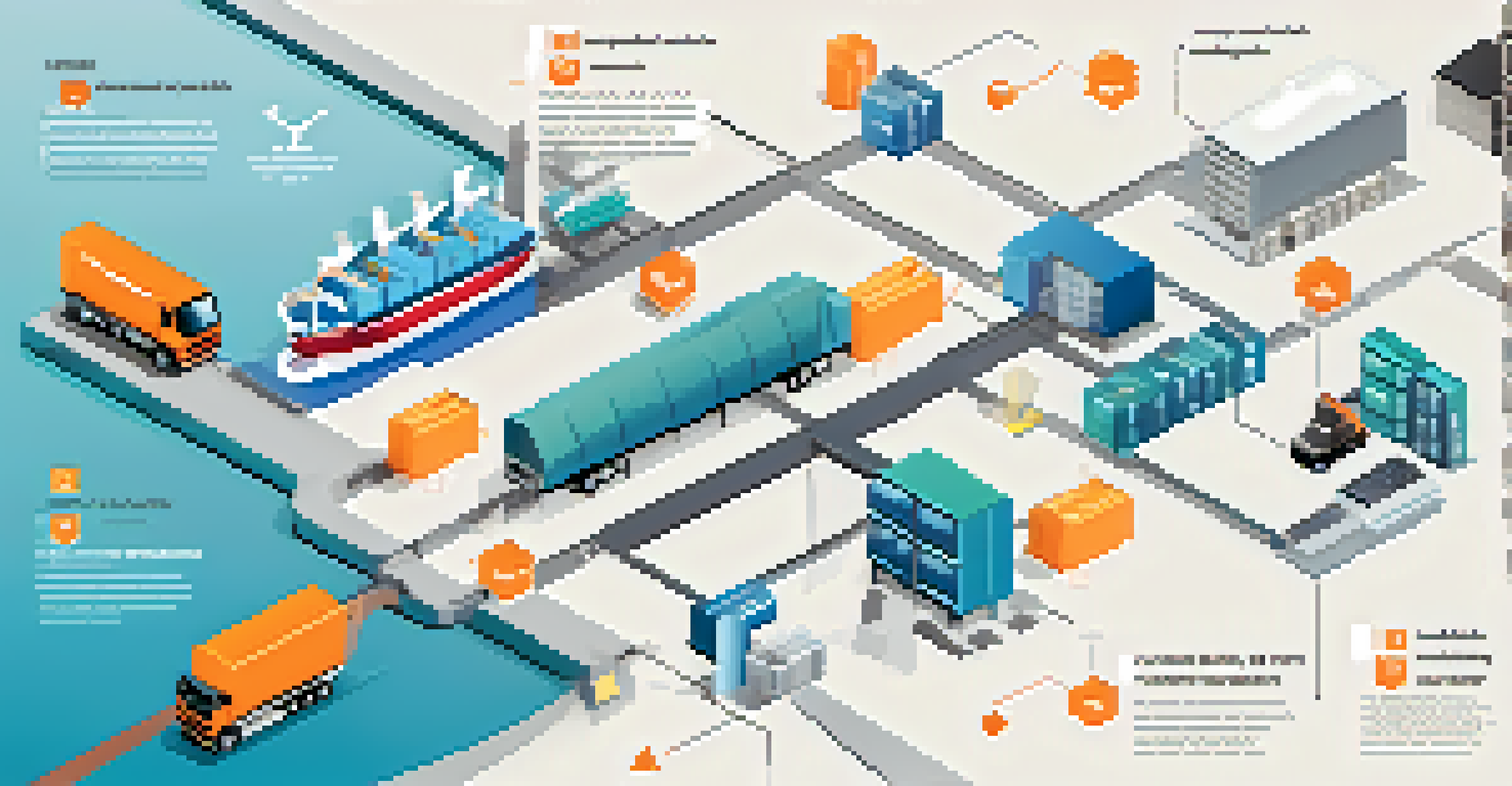The Impact of Blockchain on Supply Chain Transparency

Understanding Blockchain and Its Basics
Blockchain is a decentralized digital ledger that records transactions across many computers. This means that once a record is added, it cannot be altered, ensuring the integrity of the data. Think of it like a digital chain of blocks where each block holds a set of transactions, all linked together in a secure manner.
Blockchain is the perfect tool for creating a transparent and trustworthy relationship between consumers and brands.
This technology provides a transparent, tamper-proof way to track assets and transactions, giving businesses and consumers a clear view of the supply chain. By using blockchain, companies can see the entire journey of a product, from raw materials to the final consumer. This level of visibility is crucial for enhancing trust and accountability in the supply chain.
The potential of blockchain extends beyond just record-keeping; it can also streamline processes, reduce fraud, and improve efficiency. As industries continue to adapt to this technology, understanding its basic principles is essential for grasping its impact on supply chain transparency.
Enhancing Traceability in Supply Chains
One of the standout features of blockchain is its ability to enhance traceability. Every transaction recorded on the blockchain is time-stamped and linked, allowing companies to trace the history of a product effortlessly. For instance, in the food industry, if a batch of lettuce is found to be contaminated, blockchain can help trace it back to its source in minutes.

This level of traceability helps businesses quickly identify problems and take corrective actions, reducing the risk of widespread issues. It also allows consumers to verify the origin of their products, fostering trust and loyalty. Imagine buying a chocolate bar and being able to trace its journey from cocoa bean to confection; that's the power of blockchain!
Blockchain Enhances Supply Chain Trust
Blockchain provides a transparent and immutable record, fostering trust and accountability among all stakeholders in the supply chain.
Moreover, improved traceability can lead to better compliance with regulations and standards. Companies can easily demonstrate that they meet safety and quality requirements, which is increasingly important as consumers demand transparency.
Boosting Trust and Accountability Among Stakeholders
In a traditional supply chain, trust can be a fragile thing, often based on relationships or contracts. Blockchain shifts this dynamic by providing a shared, immutable record that all parties can access. This transparency fosters a culture of accountability, as everyone involved in the supply chain can see the same information.
The future of supply chains is not about products; it's about trust.
For example, if a supplier is consistently delivering high-quality materials, this can be recorded on the blockchain. Other stakeholders can access this information, reinforcing trust and encouraging collaboration. On the flip side, if issues arise, they can be pinpointed quickly, ensuring accountability for all parties involved.
This trust extends to consumers as well. Knowing that a product's journey is documented on a blockchain can reassure customers about its quality and ethical sourcing, creating a stronger connection between brands and their audiences.
Reducing Fraud and Counterfeiting Risks
Fraud and counterfeiting are significant challenges in many industries, particularly in luxury goods and pharmaceuticals. Blockchain technology helps mitigate these risks by providing a secure way to verify the authenticity of products. Each item can be assigned a unique digital identity, making it nearly impossible for counterfeit products to infiltrate the legitimate supply chain.
Take the luxury watch market, for instance. By using blockchain, a watch's entire history—from manufacturing to ownership—can be recorded, allowing buyers to verify its authenticity before making a purchase. This level of verification not only protects consumers but also safeguards brand reputation.
Improved Traceability with Blockchain
The technology allows for effortless tracking of products, enabling quick identification of issues and verifying product origins.
Furthermore, the transparency that blockchain offers means that any discrepancies can be quickly identified and addressed. This creates a deterrent for potential fraudsters, knowing that their actions are easily traceable.
Streamlining Supply Chain Processes with Smart Contracts
Smart contracts are another innovative aspect of blockchain, acting as self-executing contracts with the terms of the agreement directly written into code. They automatically enforce and execute agreements when predetermined conditions are met. For example, a smart contract could automatically release payment to a supplier once goods are delivered and verified.
This automation reduces the need for intermediaries, cutting costs and speeding up transactions. Imagine a world where payments and deliveries are seamlessly integrated, eliminating delays and disputes—this is the promise of smart contracts in supply chains.
Additionally, smart contracts enhance transparency, as all parties can view contract terms and execution status in real-time. This not only builds trust but also ensures that everyone is on the same page, reducing misunderstandings and fostering smoother operations.
Impact on Sustainability and Ethical Sourcing
As consumers become more environmentally conscious, sustainability and ethical sourcing are more critical than ever. Blockchain technology can play a significant role in supporting these initiatives by providing transparent documentation of a product's lifecycle. This allows companies to showcase their sustainability efforts and verify claims about ethical sourcing.
For instance, a clothing brand can use blockchain to demonstrate that its cotton is sourced from sustainable farms and that its manufacturing processes minimize environmental impact. This level of transparency can attract eco-conscious consumers who are willing to pay a premium for ethically produced goods.
Smart Contracts Streamline Processes
By automating agreements, smart contracts reduce costs and enhance efficiency in supply chain transactions.
Moreover, by tracking the environmental impact of supply chain activities, businesses can identify areas for improvement. Blockchain not only helps companies meet consumer demands for sustainability but also positions them as leaders in corporate responsibility.
Challenges and Considerations for Implementation
While blockchain offers numerous benefits for supply chain transparency, it’s not without challenges. One major hurdle is the initial cost and complexity associated with implementing blockchain technology. Companies must invest in infrastructure and training, which can be daunting for smaller businesses.
Additionally, there's the issue of data privacy and security. While blockchain is generally secure, companies must still manage who has access to their information and ensure that sensitive data is protected. Striking the right balance between transparency and confidentiality is crucial.

Finally, for blockchain to be effective, industry-wide collaboration is essential. Stakeholders must be willing to share information and work together, which can be challenging in competitive markets. Overcoming these challenges will be key to unlocking the full potential of blockchain in supply chain transparency.